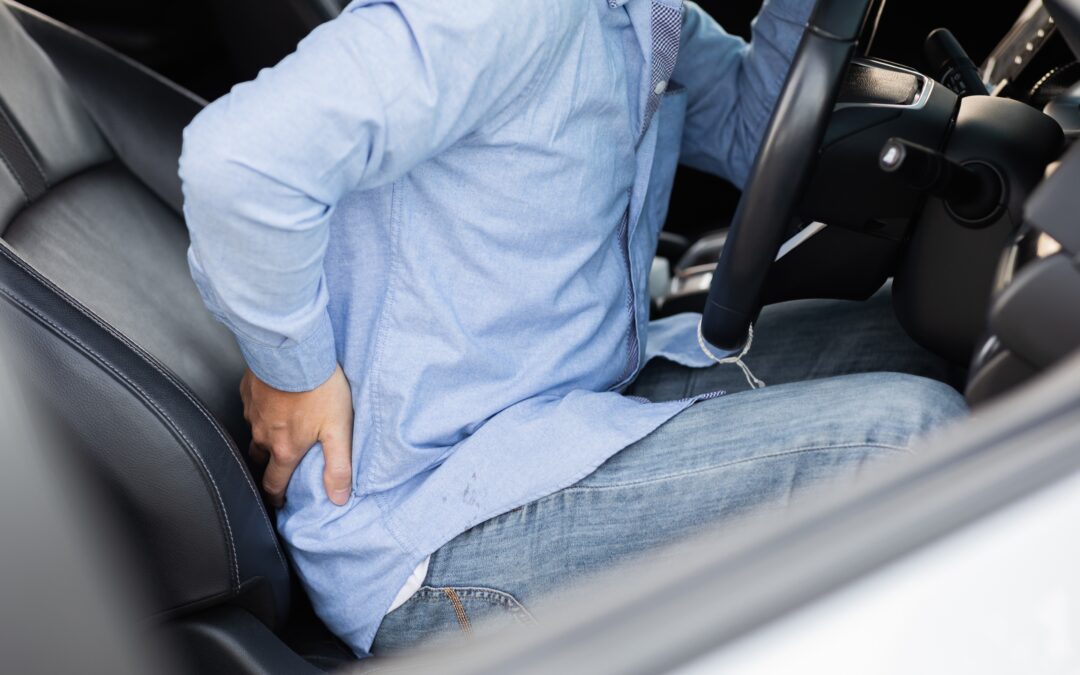 A car accident can have serious repercussions on many aspects of your life – from financial and emotional to how you live your daily life. It can also have a significant impact on your overall health, especially your back and neck. Even accidents caused by low speeds can lead to discomfort, pain, and serious injury. And because it is so important for your overall health and wellbeing, it is essential to be diligent about your spine health, especially after a car accident.
A car accident can have serious repercussions on many aspects of your life – from financial and emotional to how you live your daily life. It can also have a significant impact on your overall health, especially your back and neck. Even accidents caused by low speeds can lead to discomfort, pain, and serious injury. And because it is so important for your overall health and wellbeing, it is essential to be diligent about your spine health, especially after a car accident.
Common Spine Injuries from Car Accidents
Car accidents can cause a myriad of injuries, but some of the most common include:
- Whiplash is one of the most common injuries caused by car accidents. It occurs when a patient’s head is quickly and forcefully thrown back and forth, resulting in neck pain, stiffness, headaches, dizziness, or numbness in the arms.
- Spinal fractures happen when one or more vertebrae breaks or cracks. They can cause sudden, sharp back pain and limit mobility.
- Herniated discs, or slipped discs, occur when the discs that cushion the area between vertebrae shifts or ruptures, pressing on the surrounding nerves and causing back pain, sciatica, or numbness in the leg.
- Soft tissue injuries such as sprains and strains are the result of overstretched tendons, muscles, and ligaments.
Importance of Medical Attention
Spine injuries from a car accident don’t always cause immediate pain, so you may not realize you even have one. That’s why it’s incredibly important to be checked by a medical professional after a car accident. Untreated spine injuries can lead to chronic pain, long-term complications, and even disability.
Protecting and Improving Spine Health After a Car Accident
While injuries from car accidents are unavoidable, there are some steps you can take to protect and improve your spine health after one, including:
- Follow your doctor’s advice. Your doctor knows what he/she is talking about. Be sure to follow the directions outlined by your doctor, including taking your medications, resting and exercising as advised, incorporating ice and heat therapy, and utilizing the services of a physical therapist. If you have any questions or concerns about your treatment plan, follow up with your doctor or seek a second medical opinion, if you do not believe that you are getting the answers that you need.
- Prioritize gentle movement and rest. If cleared by your doctor, gentle, low impact physical activity is a great way to stretch and strengthen your back. Rest is also incredibly important for back healing after an accident, so avoid heavy lifting or high-impact exercise during your recovery.
- Maintain good posture. Poor posture causes the muscles in your neck and back to work harder than they should, forcing your immune system to go into overdrive to heal them, leading to inflammation, then possibly long-term pain. Good posture helps keep your bones and joints in proper alignment, supports the natural shape of your spine, and protects your musculoskeletal health. Focusing on good posture will go a long way in aiding your recovery.
Tips for Long-Term Spine Health Post-Recovery
There are several steps you can take to protect your spine before and after an accident that will promote life-long health, especially in your spine.
- Manage your weight. The more weight you carry, especially in your mid-section, the more strain it puts on your back. On the reverse side, if your body is operating in a calorie deficit, it may borrow energy from the bones and muscles supporting your back. A healthy back begins with maintaining a healthy body weight for your frame.
- Stay active. You should prioritize at least two and a half hours of exercise with moderate intensity, such as walking or cycling, each week. Swimming or doing water aerobics also provide great benefits to your spine and overall health. Studies show that 20 minutes of exercise just three times a week can significantly reduce neck and back pain in as little as four weeks (1).
- Strengthen your core. Your core muscles, those in your abdomen and back, are pivotal for helping your back heal and protecting it from future injury. Normal daily activities don’t usually engage your core muscles, so it is important to incorporate targeted core exercises into your routine.
- Regulate your stress. Stress and anxiety can negatively impact your immune system, blood pressure, blood flow, breathing, and heart rate – all of which are essential in healing and spine health. Massages and relaxation practices such as deep breathing, progressive muscle relaxation, and meditation help alleviate the mental and emotional
tension that is putting undue stress on your back.
Seeking Further Medical Attention
If you are experiencing these symptoms, it is critical to seek additional medical attention:
- Persistent back or neck pain
- Tingling or numbness
- Muscle weakness
- Persistent headaches
- Stiffness or restricted movement
- New symptoms that weren’t present at last medical examination
Regular check-ups with a healthcare provider can help monitor your healing progress and address any ongoing challenges that could develop or get worse.
Your spine is a delicate, complex system of bones, muscles, ligaments, and nerves, so it is especially vulnerable to injury in the event of a car accident – even the slightest tweak can cause serious injury and long-term consequences. That’s why it is so critical to ensure you are under the care of medical professionals to help reduce complications and empower healing.
At Englewood Spine Associates, our goal is to help you feel better so that you can get back to living with less pain. With over 25 years of experience in providing spinal care and surgery, we have the expertise and resources to treat your back condition – no matter how severe. If you are experiencing back pain, after a car accident or otherwise, please contact us for a consultation.



Recent Comments